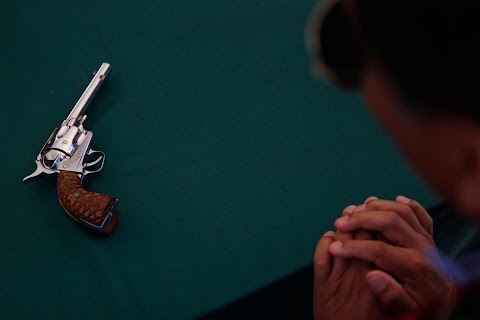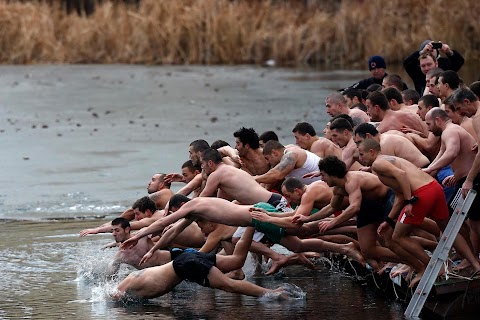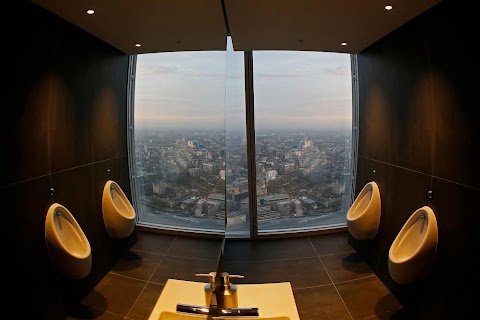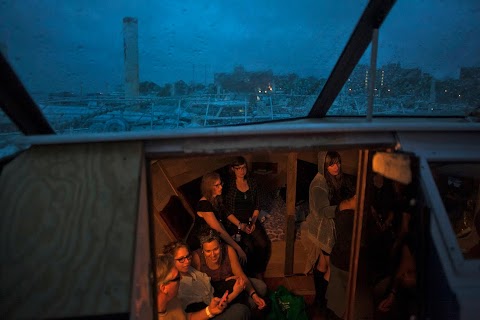
Nigeria's illegal oil bunkerers
 Akintunde Akinleye
Akintunde Akinleye
Thousands of people in Nigeria engage in a practice known locally as "oil bunkering" - hacking into pipelines to steal crude then refining it or selling it abroad.
The practice is both environmentally damaging and costly for the state. But many of those who take part see their actions not as stealing but as claiming what is rightfully theirs.

Forty-eight-year-old Ebiowei drags a hose used to siphon crude oil at an illegal refinery site in Nigeria's oil-rich state of Bayelsa. Workers like him can earn $50 to $60 a day according to locals in the industry, but this money comes at great cost to the state.
The finance ministry estimates that oil theft managed to lift around a fifth of NIgeria's two million barrel a day oil production last year, a significant sum in a country that depends on oil for 80 percent of its earnings.

However the costs are not just financial and accidents frequently happen. Here, a man paddles through a swamp after an oil pipeline explosion, caused by stealing fuel, that killed at least three people.
Slideshow

Despite the quantity of oil being pumped nearby, a fuel station stands closed with its equipment covered up in Ahoada community near Nigeria's oil hub city of Port Harcourt.

An illegal oil refinery burns in a creek in the Niger Delta after it was targeted by the military. Soldiers in the area engage in periodic crackdowns on illegal refineries, setting them ablaze.

Canoes lie in oily mud near Port Harcourt. Oil slicks, which lie on the surface of the water and clot the roots of plants, are one of the consequences of bunkering, as the workers hack into pipelines and then leave them to hemorrhage.

Refinery workers are reflected in polluted, stagnant water at an illegal oil refinery near river Nun. Although the illegal refiners only make up a small portion of oil theft in Nigeria, the environmental damage they do is huge, as oil spilling from leaky pipes pollutes vast tropical waterways.

A worker named Godswill scoops oil from a mini storage unit filled with crude waiting to be processed at an illegal refinery.

A man collects polluted water at an illegal refinery as the equipment steams behind him.

Ebiowei, 48, carries refined oil in buckets as he walks through the mud at an illegal refinery.

He pours water on a burner at the illegal refinery to reduce the intensity of the flame.

Steam rises from pipes carrying refined oil from a burner into broken containers.

A man works in the smoggy atmosphere of an illegal refinery.

A young worker with his clothes soaked in oil stands in front of an oil burner.

A worker at an illegal site uses a funnel to pour thick crude oil into a burner where it will be cooked and refined.

Men guide a boat packed with drums of refined stolen oil through a creek.

A speedboat churns up the oil-slicked water of Bodo Creek, which has blackened the bottom of mangroves growing on the bank.

A young woman named Akpomene sits coated in oil stains in her canoe near river Nun. Akpomene catches fish and sells them to help her family, just like many others in the state of Bayelsa who make their living as subsistence fishermen. She washes after fishing but still has sticky rashes on her body.

A sign belonging to the company Royal Dutch Shell stands along the Nembe creek in Bayelsa warning people not to anchor.
"Oil bubbling out of the ground has swollen this beast of corruption to monstrous proportions."
I never wanted to be a photojournalist. I loved broadcasting and had nurtured dreams since childhood of being a radio or TV correspondent. Almost by accident, I picked a camera at age 11 instead and started shooting pictures. Well, here I am.
My first degree was in social studies at Ondo State University, in Nigeria’s southwest. It didn’t do much to advance my photojournalism career, but I learnt about society – both theory and practice. Years later, I did two post graduate diplomas - in journalism and mass communications.
In a country like Nigeria, academic qualifications don’t take you far, though, unless you also learn how to adapt to the rough and tumble of life here. Be sure, Nigeria is a school!
My birthplace is a country of 160 million - a vibrant population housing something like one fifth of the world’s black people. It is blessed – or should I say cursed? - with huge natural resources that for decades have attracted foreign visitors to trade with it, and eventually, in the case of Britain, to conquer and colonise it.
The people are its best resource, more important than oil or gas - though politicians seem to forget this sometimes. Some of the best brains in mathematics, engineering, economics, literature, medicine, photography, music and other human ways of life had emerged from its shore. Economists frequently say it has the potential to join the world superpowers.
Unfortunately, history has yet to realise that potential. Civil war followed independence from the UK in 1960, one of the bloodiest in Africa’s bloody history, killing over a million people in two years. Since then, decades of military rule and flowing petrodollars have conspired to entrench a culture of corruption that Nigeria still hasn’t managed to shake off – even after more than a decade of democracy.
Oil bubbling out of the ground has swollen this beast of corruption to monstrous proportions. Elites from every corner of the country struggle to get a piece of the 'national cake', neglecting education, employment, health care and infrastructure to wallow in disrepair as they chase the oil dollars. State funds get funnelled into private pockets, while more than three quarters of the population lives in extreme poverty.
In the Niger Delta, residents have watched for decades as black goo gets pumped out of their ancestral lands, making billions for foreign oil companies and Nigerian elites, while they stay poor. Small wonder, then, that some of them decided to steal some of it back.
Crude oil theft, locally known as ‘bunkering’ became a phenomenon during the years of militancy against the oil industry in the early 2000s. Thieves hack into or blow up pipelines to steal the crude oil, then sell it on international markets or refine it locally. When they’re done, the pipeline spews oil for miles around. An official amnesty was granted in 2009 to the delta militants, officially ending the conflict, but that hasn’t stopped the oil theft. In fact, it’s got worse.
Beginning in 2010, I had flown across the delta many times, over some of the creeks where the oil thieves had gone to set up mini illegal refineries - burning off about 150,000 barrels of crude oil daily, according to an estimate from the ministry of finance. This latest trip, last month, took 14 days.
Was it safe? Steve Crisp, my boss, asked me before I set off. I thought about this. Well, they had guns, so it all depended on whether they minded me turning up with a camera and snapping shots of them. But I knew from experience that many of the militants see what they’re doing as claiming what’s rightfully theirs, so they don’t mind being photographed.
Crossing the four states of the delta in speedboats was an uphill task but also a worthwhile venture.
In Bayelsa - the home state of Nigeria’s president Goodluck Jonathan - the outer part of river Nun is an exhibit of military check points with men armed to the teeth. The connecting creeks pump thick smoke from the locally built crude oil burners. From the Ogoni riverine, further east, the sites of illegal oil refineries are dotted throughout.
In the recent days, a military campaign has been intensified to reduce the activities of the vandals involved in this illegal and environmentally damaging business. There is also a campaign to sensitise them to the harm they are doing. But until Nigeria’s elites stop thieving the country’s oil wealth, I can’t see how they will persuade the unemployed youths of the delta to stop it.














